DEFENSELESSThe Trials of Andrea Yates |
In the un-humbled opinion of one, Poetic Justice...
Yates Declared Not Guilty
Texas Prosecutors Found Criminally Insane
July 26, 2006
While there may be some question about the exact state of Andrea Yates' psychotic mind when she drowned her own children -- Texas prosecutors absolutely know what's right and what's wrong. It was clearly wrong to try Andrea Yates instead of coming up with some alternate resolution.
By all accounts, Yates was an extremely ill woman who had no intent to murder her children. She loved her five children.
And yet, prosecutors pushed and pushed to get revenge on this poor woman. Even through a million dollar mistrial, they pushed for a second chance to punish Yates by throwing her in prison for life, thereby denying her the proper medical treatment she needs.
After four weeks of testimony and twelve hours of deliberation, the Harris County jury returned a verdict declaring Andrea Yates not guilty by reason of insanity.
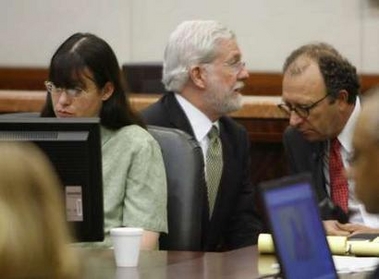
Yates, George Parnham and Wendell Odom
"The sickest person
I've ever seen in a mental hospital."
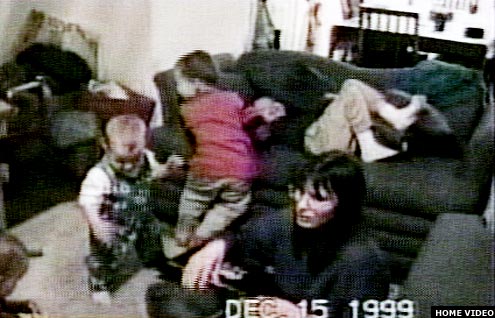
|
By PEGGY O'HARE and DALE LEZON
At a psychiatric hospital just months before she drowned her five children, Andrea Yates could not feed herself and was forced to hold her infant daughter at her husband's insistence, a nurse told a Harris County jury.
|
|
By ANGELA K. BROWN
Andrea Yates attempted suicide twice in 1999, first swallowing about 50 sleeping pills and then holding a knife to her throat, according to testimony at her retrial for the 2001 bathtub drownings of her children.
|

Harris County Tries, Tries Again
June 27, 2006
Andrea Yates sobbed as prosecutors played a videotape in court during her re-trial. The video showed her 7-year-old son floating dead in a bathtub and the lifeless bodies of her four younger children laid out on a bed.
Despite overwhelming evidence of the defendant's on-going, disabling illness, and evidence of their own illegal acts which resulted in an overturned verdict, Harris County prosecutors still insist they want Andrea Yates to sit in prison until she dies. For strategic reasons, Yates is being tried only in the deaths of Mary, John and Noah.
Defense attorney, George Parnham, seems more confident about this second-go-round. He told reporters he planned to call Rusty Yates, as he did in the first trial, but that he'd approach him in a "different" way.
Prosecutor, Kaylynn Williford, maintains Andrea Yates doesn't fit the state's legal insanity definition: the defendant did not know the conduct was wrong at the time because of severe mental disease or defect.
"Everything I've seen has reaffirmed that she was sane at the time she killed her kids," says Williford.
Andrea Yates has twice pleaded Not Guilty by reason of insanity. Texas has yet to plead a convincing case for their insane persecution of this poor woman.
GUILTY
 AGAIN
AGAIN
Guaranteed Future Psychotic Depression
On Saturday, March 18, 2006, Russell Yates will re-marry. On Monday, March 20, Andrea Yates will be re-tried for the drowning deaths of their five children.
The timing of Mr. Yates' wedding speaks volumes.
If Andrea Yates wasn't already mentally ill when she met and married Russell -- he certainly did his best throughout their marriage to drive her nuts. Between his bizarre religious practices, his determination to house the family in an old bus and his insistence that his wife home-school all the children -- Andrea never had a chance.
Practically from the beginning of the marriage, Andrea was being drowned by her husband's radical, religious demands. Evidence of her unstable mental condition surfaced almost immediately, but Rusty chose to put his faith in street preachers and ignore counsel from medical professionals.
Andrea was pregnant for 40 of the 90 months the Yates were married.
Following the birth of their fourth baby and Andrea's multiple suicide attempts, a doctor strongly cautioned Mr. Yates that the couple should not have any more children. He was directly told that another child would "guarantee future psychotic depression." Lusty Rusty dismissed those warnings, and soon a fifth baby entered the nightmare.
Father Knows Best
Family and friends begged Rusty to get help for his wife. Their desperate appeals were rebuffed. Rusty was the head of his household and no one could tell him anything. Father knows best and to hell with all the rest.
On the weekend prior to the drownings, family friend, Debra Holmes visited with Andrea and witnessed her severe condition. She told Rusty his wife needed to go to a doctor. When he mentioned Andrea had an appointment for the following Tuesday, Debra Holmes flatly warned: "Rusty, she's not going to make it through the weekend."
She didn't.
Having been cut off of her regular regiment of antidepressants and anti-psychotic medication by the family's HMO plan, Andrea Yates went off the deep end. Tortured by secret agents watching through invisible cameras, threatened by talking bowls of cereal, and directly challenged by Satan himself, Andrea drowned her precious babies in the bathtub.
Asked about leaving his extremely ill, delusional, psychotic wife at home alone with five small children, Rusty could only manage to explain, "I didn't think she'd ever hurt those kids." Everybody agrees with that. Andrea Yates would never -- could never -- hurt those kids. So who's responsible for slaughtering that family?
Father knows best.
Rusty was the big man in charge of everybody -- but he "didn't think." His unthinking behavior is clearly criminal. In fact, back in 2001, prosecutors were considering charging the devout dad with negligent homicide or child endangerment but, for whatever reasons, those charges were never filed.
As the warm peal of wedding bells gives way to the cold knock of a judge's gavel, it should become obvious to Yates' new jury that Russell -- not Andrea -- is the guilty one. He is guilty of the evil, premeditated murders of not only his children, Mary, Luke, Paul, John and Noah, but also of his wife, Andrea.
And if the pattern holds, it's guaranteed that Rusty Yates' next victim will soon be walking down the aisle of a church.
"I'm happy, happy for Andrea . . . I think she needs to be in a state mental hospital
until she's well. Had she not been mentally ill, she never would've done what she did."
-- Russell Yates
Texas Gets a Second Chance

Well, they always say, "Don't mess with Texas," and
now we know why.
|
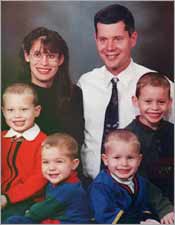
"It was the seventh deadly
sin. My children weren't righteous. They stumbled because I was evil. The
way I was raising them they could never be saved. ... Better for someone
else to tie a millstone around their neck and cast them in a river than stumble.
They were going to perish."
"I was so stupid! Couldn't I have killed just one to fulfill the prophecy?
Couldn't I have offered Mary?"
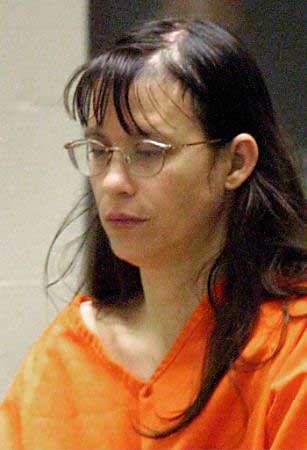
| Noah, 7 years old. John, 5 years old. Paul, 3
years old. Luke, 2 years old. Mary, 6 months old all died at the hands
of their mother Andrea Yates. She drowned all five of her children in the
bathtub of her suburban Houston home during a one-hour period on June 20, 2001. Andrea Yates was home-schooling the children while being treated for major depression with psychotic features. Following two suicide attempts and several bouts of postpartum depression, a doctor cautioned Mrs. Yates and her husband, Russell, not to have further children following the birth of their fourth child. Russell Yates offered no explanation for his refusal to act on behalf of his children, except to explain that, "I didn't think she'd ever hurt those kids." |
Why?
The prosecution could not find a single person to testify that Andrea Yates
was anything but a warm, loving and tirelessly devoted mother. What possible
motive was there for her to drown her own children?
The jurors ran out of the jury room after a few hours of agreeing that the
drowning of five innocent children was a horrible event. They determined
that Andrea Yates was mentally ill, but that “she knew it was wrong,
or she would not have called the police."
In their ignorance, they concluded that if she were psychotic, she would
also have to be stupid.
But again, there were no adverse witnesses, no testimony about hastily arranged
insurance policies and not one single piece of physical evidence to suggest
that Andrea Yates was anything other than a very sick, but very loving
mother.
Perhaps if the jury had spent a little more time contemplating the lack of
any malice on Yates' part – instead of the malice they felt toward her,
they wouldn't have come to the same paranoid, schizophrenic conclusion that
Medea did:
"I know, indeed, the evil of that I purpose;
but my inclination gets the better of my judgment."
"They stumbled because I was evil. The way I was raising them they could never be saved. Better for someone else to tie a millstone around their neck and cast them in a river, than stumble. They were going to perish."
-- Andrea Yates
Andrea Yates was pregnant for 40 of the 90 months
the Yates were married. |
The Politics of Gender
Imagine the outrage if the jury in the
Thomas Junta
"Hockey Dad" trial had concluded that in fact, Junta had merely acted
in self-defense, but that he was nonetheless guilty of manslaughter, since
victim, Michael Costin's death was so horrific.
The judge would have overturned the verdict as unreasonable.
In the Andrea Yates trial, as in the Junta case, the jury was not asked to
punish the defendant. They were asked whether or not the defense proved their
case. Juror, "Melissa" was quick to admit that the defense met their
burden of proof, rather flatly stating "I think there's no doubt in any one
of us's minds that she was mentally ill."
If that is true, then to continue speculating about exactly when and to what
degree she was psychotic is beyond the juror's scope. The medical experts
on both sides agreed Yates was a very sick woman with a long documented history
of mental illness.
Even if the jury distrusted the doctors, they had the testimony of Debra
Holmes who witnessed her friend's tragic decline into murder and madness:
"I couldn't believe how much weight she had lost. She looked like a cancer
patient. Her shoulders were hunched, she walked with slow steps holding her
arms, and her face was expressionless."
Holmes said she asked Russell Yates that fateful weekend whether his wife
had an appointment to see a psychiatrist. He told Holmes his wife had an
appointment for the following Tuesday. Debra Holmes responded: "Rusty,
she's not going to make it through the weekend."
Dr. Melissa Ferguson, the medical director of psychiatric services
at the Harris County Jail testified that, "In all the patients I've treated
for major depression with psychotic features, she is one of the sickest I've
ever seen," noting that she had treated 6,000 patients when she stopped
counting several years ago.
The blood thirsty yahoos who tried this case didn't care if every doctor
in Texas told them Andrea Yates was mentally ill, they wanted vengeance for
the drowning of those five children.
In seeking to bring this tragic case to trial by jury, the wretched state
of Texas gathered like vultures around five children who the state didn't
give a damn about, until they were killed by the known psychotic that was
home-schooling them.
I hope the good Christians of Harris County, Texas are happy with themselves.
They have spent well over a million dollars to insure that Andrea Yates will
continue to be denied the proper medical treatment she was denied prior to
the drownings.
"She was convinced
that the children were going to be tormented for the rest of their lives
and that they were going to perish in the fires of hell."
-- testimony of Dr. Ferguson, medical director
of psychiatric services at the Harris County Jail
Yates believed television cartoon characters spoke to
her and her children, Ferguson said. The messages to the children were
"Don't eat too much candy" and "Your mother's feeding you too much
cereal."
Yates was convinced that there was a camera watching her from the cell's
light fixture and asked Dr. Ferguson how long she had been under surveillance.
She also believed the media had put cameras in her house years ago to monitor
her behavior as a mother.
Ferguson said Yates was immediately put on anti-psychotic and anti-depressant
drugs and that she continues to take multiple doses of four medications.

John Bayliss, a jail nurse who has observed Yates since her arrest,
followed Ferguson to the stand said Yates requested her hair be cut in the
shape of a crown the day after the deaths.
Bayliss said Yates appeared to be "internally occupied'' and thought she
may have been hearing voices in the weeks after she was jailed. "She was
a person who wasn't connected with reality at all,'' he said.
Death Penalty
Capital of the U.S.A.
Since 1975, the people of Harris County
have sent 250 men and three women to
death row -- more than any other jurisdiction
in the nation.
"Something of vengeance I had tasted for
the first time; as aromatic wine it seemed, on swallowing, warm and racy:
its after-flavour, metallic and corroding, gave me a sensation as if I had
been poisoned."
-- Charlotte Brontë
Harris County judges are elected by popular
vote, rather than being appointed to the bench.
The judges have complete control over
appointing and supervising attorneys in
death penalty cases.
Russell Yates
"I struggled with it all
last night. I couldn't sleep last night. I was like, was there anything I
could have done?"
"To me, she fully recovered from the first depression. She had a recurrence
after the second child. Really, the same symptoms, the same timing, both
about peaking about 3 months after giving … after having the baby. Our
fourth son Luke. Also Mary, our little girl. And to say they are related
… the symptoms were the same. I think she was predisposed to getting
this depression, and I think that that is, you know, they are related in
that sense."
"We home schooled them. Primarily Andrea during the day, during the morning
time, for a few hours. We had normal curriculums we followed. I thought it
was going pretty well. I'm not saying it's not stressful, but it was manageable.
It's just she, she couldn't do it while she was depressed. But ordinarily
she enjoyed it. We had a unit study program for the children that was really
good, you know. She could teach them all kind of together, even the ones
who weren't school age, they would participate. And we had a couple little
workbooks they did for math, and she taught them phonics and my oldest two
knew how to read. Noah and John."
"I helped in the evenings, but you know, she did the bulk of the work. That
was like how she perceived her job. That's what she wanted to do."
"I left the house for work about 5 or 10 [minutes] till 9:00 … it took
me 10 or 15 minutes to get to work."
"In less than hour I got a call from my wife and she said, you need to come
home. And I said, what's going on? And she said, you need to come home. I
just, you know, just hung up. I was afraid of her tone. You know, her tone
was very serious."
At the time of the murders, Russell Yates held a surprise news conference
on his lawn and said, "It took me 10 or 15 minutes to get to work -- In
less than hour I got a call from my wife and she said, you need to come
home… And I said, what's going on? And she said, you need to come home.
I just -- you know -- just hung up. I was afraid of her tone… You know,
her tone was very serious."
Apparently Andrea gave no details, but only indicated that there was an
emergency.
But that's not what Rusty told Sgt. David Svahn, who said Mr. Yates came
running up to the house: "He was screaming and hollering. He was saying,
`What did she do to my kids? What did she do to my kids?' He said his wife
had called him at work and told him it was time to come home. His wife told
him she had hurt all five of the kids and that she finally did it."
I believe Mr. Yates was doing a bit of dramatic acting on his porch that
day; unfortunately he was performing a scene before he was properly cued.
The officer said it was only then that he informed Mr. Yates that his children
were dead. "At that point he fell to the ground and began hitting his hand
on the ground." Svahn said he then picked up a plastic chair from the yard
and threw it.
Conceived in Liberty
Following two suicide attempts and several bouts of postpartum depression,
a doctor cautioned Mrs. Yates and her husband, Russell, not to have further
children following the birth of their fourth child.
A “no-scalpel” Vasectomy is inexpensive, very safe, easy to perform
and has reported annual pregnancy rates of less than 1 percent.
Russell Yates said he could tell his wife was depressed, but thought medication
would help her to snap out of it -- so he and his son Noah posted a list
of ways for Andrea to deal with her stress on a board. The list hung on a
wall inside the family's filthy one-story, brick home.
I wonder if the word Vasectomy appeared on that list.

| Andrea
“She was always trying to be such a good girl,”
Andrea's mother, Jutta Kennedy said. “She was the most compassionate
of my children. Always thinking of other people, never herself. She was always
trying to care for everybody.” Kennedy recalled how every day, for eight
years, Andrea would come to her parents' house to take care of her father,
Andrew Kennedy, who suffered from Alzheimer's. Rusty
|
| There but for
the grace of GOD
|
| A former Grand Rapids street preacher whose
fire-and-brimstone style led to him being exiled from his hometown, is embroiled
in the case. His name is Michael Woroniecki. Letters written by West Catholic High School graduate Michael Peter Woroniecki and his wife to Andrea Yates may have contributed to Yates' downward mental spiral, according to "Breaking Point," a book by Texas author, Susan Spencer. Woroniecki, 47, was described by Rusty Yates as a "quiet and simple preacher" who asked "fat cat preachers" the kinds of questions he, too, wanted answered, Spencer said. In the years that followed, the Woronieckis served as spiritual advisers to the Yateses, while Rusty Yates and his wife sent the Woronieckis money to support their ministry. "They communicated via letters once or twice a year," Spencer said. "And there were references in the letters to phone calls and tapes and to Andrea sending them 'goodies.' " Some of the letters written by the Woronieckis to Andrea Yates contained negative, troubling messages, Spencer said. "The letters say all women are descendants of Eve, and Eve was a witch," she said. "And women, particularly women who worked outside the home, are wicked." One of those letters was written to Yates in spring 1999, a few months before her first suicide attempt. "The Woronieckis' letters are hammering her about her salvation," Spencer said. Gerald Woroniecki, of St. Cloud, Fla., said he recently spoke to his brother about the relationship with the Yates family. "He has been ministering to them," he said. "He (Yates) wanted to learn more about God's word and the Bible. That's how the relationship got started. Where it went, you'd have to find out from Michael." While Woroniecki's roots are in Grand Rapids, his life has been on the road -- a traveling preacher who frequents college campuses, sporting events and any occasion that might garner national media attention. The father of six has set up his microphone and spouted his version of Christianity at Mardi Gras, the Rose Bowl and at least two Olympic games in the last decade. Woroniecki's early fame came on the gridiron, first playing for West Catholic High School, then as a fullback for Central Michigan University. Raised a Catholic, Woroniecki became a born-again Christian in college. His mother gave him a Bible to read while he was hospitalized with a football injury. Once back on the field, Woroniecki wore a gold cross on his maroon CMU helmet. By 1980, Woroniecki had morphed into one of Grand Rapids' most notorious street preachers. The former Southeast Side resident was in his mid-20s when he began using a bullhorn to deliver his scathing pronouncements of sinners. He frequently tried to shame people on downtown sidewalks, and outside public events, concerts and churches on Sunday mornings. He often walked through crowds wearing a homemade wooden cross attached to his belt. While living in Grand Rapids, Woroniecki was arrested at least five times and charged with a variety of offenses, mostly disorderly conduct and disturbing the peace. He was convicted twice and acquitted once. Another trial ended in a hung jury. The last arrest came in October 1981, when Woroniecki was accused of accosting a woman. He allegedly told the woman she was a sinner who was going to hell, berating her until she was in tears. Faced with jail time if convicted, Woroniecki agreed to an offer by the city attorney's office: stop preaching and leave town in exchange for the charges being dropped. The deal ousting Woroniecki from Grand Rapids made national news. |
Effexor, Remeron,
Wellbutrin, and Haldol
On April 2, three months prior to the killings, the program director at Andrea
Yates' mental hospital had requested a judge order Yates committed to the
Austin State Hospital .
The next day, Dr. Saeed sent a letter to the same judge saying Yates
(whose first name he wrote was Amanda), had signed in voluntarily and that
the hospital would like to discontinue the court proceedings .
Dr. Saeed then prescribed Effexor, Remeron, Wellbutrin, and eventually Haldol
to the strangely "catatonic" Andrea Yates.
Andrea cannot be blamed in this matter. She was doing her part! She was screaming
out for help. The program director heard those cries, but his rescue was
aborted by Dr. Saeed.
This goes beyond a matter of a doctor's negligence, and extends to a doctor's
willful, intentional and premeditated actions.
He recklessly drove the Yates and their children down the wrong side of the
street and then jumped out of the car just before the family crashed.
Dora Yates, the children's 63-year-old grandmother said: "She appeared
almost catatonic, and did not respond in conversation. If I asked her a question,
she often whispered a delayed answer or did not answer at all. She would
stare into space. Her arm trembled. She would tap her foot and scratch her
head until it was bald in spots. She bit her lip. She didn't eat."
Dora Yates said her daughter-in-law seemed somewhat better when she came
home from the hospital, but still exhibited strange behavior -- walking in
circles for 30 minutes at a time, often holding her infant daughter. She
also stared at a cartoon show for a "long time" the day before the killings,
but without laughing, Yates testified.
Andrea Yates was admitted to a treatment center on May 4 in a "nearly catatonic"
state. Russell Yates brought his wife back to the hospital because her depression
was deteriorating and she had not been eating.
The Crime of Doing Nothing
Due to a citizen's constitutionally guaranteed freedom of Religion, under
current law, most states recognize parents who try to heal their children
solely with prayer by including legal defenses for most degrees of homicide
and child abuse.
If children are permanently injured or if they die, and the parents prove
to a judge or jury that their faith governed their actions, they are immune
from criminal liability.
All parents have a fiduciary responsibility to their children. The parent's
failure to protect a child is legally recognized as negligence. Here are
some samples of religious parents who've been convicted of -- the crime
of doing nothing.
| Natalie Rippberger, eight months, died of
h-flu meningitis. The parents had retained a Christian Science practitioner
for spiritual "treatment" but would not get essential medical care for their
daughter. Natalie's parents, Mark and Susan Rippberger, were charged with
felony child endangerment and involuntary manslaughter. Both were convicted
of felony child endangerment. Shauntay Walker, age four, died of meningitis. Shauntay was home sick from her pre-school for 17 days. She received no medical care, only prayer. Shauntay's aunt, Claudia, reported that Shauntay was comatose and had lost a lot of weight. She told Shauntay's mother, Laurie, to take the child to the doctor, but Laurie refused. When Claudia told Laurie she would notify the authorities, Laurie moved her children to the home of another Christian Scientist. Shauntay died there a few hours later. Laurie Walker was charged and convicted of involuntary manslaughter. Amy Hermanson, seven, died in Sarasota, Florida, of untreated juvenile onset diabetes. Her parents refused to provide her with necessary medical care, claiming that Amy had become sick because of negative vibrations received from outside the home. Amy's parents were charged with felony child abuse and third degree murder. Both were convicted on the charge of third degree murder. Robyn Twitchell, age two, died in April, 1986, in Boston, Massachusetts, of a bowel obstruction. A simple operation to remove the twisting of the bowel would have most likely saved Robyn's life. Robyn was seriously ill over a five day period; he was in severe pain, vomiting intermittently and he had serious difficulty eating and sleeping. The parents, David and Ginger Twitchell, did nothing more than contact a church practitioner about Robyn's illness. The Twitchells were convicted of manslaughter, a conviction which was later overturned on a technicality. Elizabeth Ashley King, 12, died in Arizona, of bone cancer. She was out of school and sick at home for a full year. Officials allowed the parents to set up a home study program for the girl. Alarmed neighbors (not the school officials) realized they had not seen Ashley for months and notified Child Protective Services. A court ordered that Ashley must be examined. Doctors determined that Ashley had bone cancer that had progressed too far to be arrested with medical treatment. The parents, John and Catherine King, pleaded no contest to the felony of reckless endangerment in their daughter's death. Lisa Sheridan, age five, died in Cape Cod, Massachusetts, after a three week battle with pneumonia without medical care. Lisa received Christian Science prayer treatment over the entire course of her illness. Lisa's mother was tried and convicted of involuntary manslaughter. Saundra Arnold, age 13, died in California after being ill 18 days with an intestinal blockage. The mother was convicted of manslaughter and her conviction was upheld by the California Supreme Court (People v. Arnold, 1967) which ruled that the law "…did not sanction unorthodox substitutes for medical attendance." Loren Willliamson, age five, died of lymphocytic leukemia in Loranger, Louisiana. Annetta Williamson, the mother prayed for divine healing instead of obtaining medical care. The coroner stated Loren died of congestive heart failure resulting from untreated leukemia. "Leukemia is a cancer, but is can be treated with chemotherapy and blood transfusions." Annetta Williamson was charged with negligent homicide but was not convicted. |
Police say Yates told them she drowned the children on June 20 in the bathtub
because she considered herself ”a bad mother.” Prison officials
tell said Andrea Yates did not request a television or radio to see or listen
to any reports on her children's funerals.
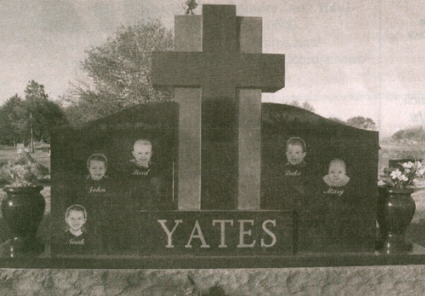
"They were all so well-behaved," said store owner Joanne Juren. "They
were just the perfect little children. I told Andrea the last time she was
here that if we had a gold star to give for the best children we would give
it to hers. Andrea just beamed."
| Vance Holmes.com / court |
| And Poetic Justice For All |